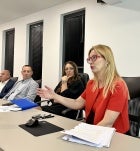Breadcrumb
Stories
Story type
- News (875)
- Feature story (248)
- Press release (212)
- In the words of ... (194)
- Announcement (95)
- Statement (83)
- From where I stand (74)
- Interview (41)
- I am Generation Equality (32)
- Take five (32)
- Speech (25)
- In focus (18)
- Media advisory (15)
- Expert’s take (12)
- Op-ed (8)
- Explainer (7)
- Youth take (2)
- A day in the life of … (1)
Topic
- Gender equality and women’s empowerment (637)
- Ending violence against women and girls (626)
- Economic empowerment (313)
- Peace and security (198)
- Humanitarian action (149)
- COVID-19 (127)
- Gender equality and inequality (124)
- Communications and media (119)
- Gender, culture and society (104)
- Youth (104)
- Partnerships (100)
- Leadership and political participation (98)
- 2030 Agenda for Sustainable Development (95)
- Conflict, war (92)
- Entrepreneurship (92)
- Beijing Platform for Action (89)
- Executive Director (88)
- Domestic violence/interpersonal violence (84)
- Women’s rights (82)
- Sustainable Development Goals (SDGs) (76)
- Education (75)
- Rural women (75)
- Human rights (73)
- Gender-responsive budgeting (72)
- Gender stereotypes (72)
- Civil society (69)
- Crisis response and recovery (69)
- Generation Equality (69)
- Innovation and technology (66)
- Health (65)
- Anti-violence interventions (63)
- Governance and national planning (53)
- Employment (52)
- Civil society participation (47)
- Men and boys (masculinity) (47)
- UNiTE campaign (44)
- Gender discrimination (41)
- Intergovernmental processes (39)
- Campaigns (38)
- Political empowerment (38)
- UN Security Council resolution 1325 (38)
- Girls (36)
- Local development (34)
- Sexual violence in conflict (34)
- Information and communications technology (ICT) (31)
- Sports (31)
- Commission on the Status of Women (29)
- Training (29)
- Women with disabilities (29)
- Climate change (28)
- Migration (28)
- Gender mainstreaming (27)
- Laws, legislation (27)
- Peace processes (27)
- Rural development (27)
- HeForShe (26)
- HIV and AIDS (26)
- Service delivery (26)
- Rape/sexual assault (25)
- Sexual harassment (25)
- Shelters (25)
- Access to justice and legal protection (24)
- Businesses and foundations (22)
- Gender statistics (22)
- Peacebuilding (22)
- Financing for gender equality (21)
- Post-conflict recovery (21)
- Care and support services (20)
- Decision-making (20)
- Governance (20)
- Gender data production and collection (19)
- Disaster risk reduction (17)
- Social protection (17)
- Feminicide/femicide (16)
- Science and technology for development (16)
- Unpaid work (16)
- Gender data gaps (15)
- Gender wage gap (15)
- Lesbian, gay, bisexual, transgender, intersex (LGBT) rights (15)
- Child marriage (14)
- Legal assistance (14)
- Sex-disaggregated data (14)
- Water (14)
- Access to justice post-conflict (13)
- Environmental protection (13)
- Financial resources (13)
- Primary prevention (13)
- Public administration (13)
- Access to basic services (12)
- Poverty (12)
- Trafficking/sexual exploitation (12)
- UN Security Council resolutions (12)
- Convention on the Elimination of All Forms of Discrimination against Women (CEDAW) (11)
- Gender data use and accessibility (11)
- New media (11)
- Political violence (11)
- UN Trust Fund to End Violence against Women (11)
- Women’s movements (11)
- Financial and economic crisis (10)
- Government contributors (10)
- Media leadership (10)
- National planning (10)
- UN Women administration (10)
- Women farmers (10)
- Beijing+20?! (9)
- Fund for Gender Equality (9)
- Sexual and reproductive health and rights (9)
- Gender equality indicators (8)
- Health care services (8)
- Migrant workers (8)
- Safe Cities and Safe Public Spaces (8)
- Capacity development (7)
- Green economy (7)
- In the words of ... (7)
- Peacekeeping (7)
- Reparations (7)
- Traditional media (7)
- Harmful practices (6)
- Markets (6)
- Public sector reform (6)
- Trust funds (6)
- Ageing/older people (5)
- Energy (5)
- Executive Board (5)
- Fundamental freedoms (5)
- Goodwill ambassadors (5)
- Macroeconomic policies (5)
- Monitoring and evaluation (5)
- National mechanisms (5)
- Parliamentary development (5)
- Rule of law (5)
- Truth and reconciliation (5)
- Women of achievement (5)
- Food security (4)
- Institutional mechanisms (4)
- National statistical systems (4)
- Productive resources (4)
- Rights in marriage (4)
- Waste management (4)
- Decentralization (3)
- Deputy Executive Director, Policy and Programme (3)
- Gender power relations (3)
- Land and property (3)
- Mediation and conflict resolution (3)
- Urban development (3)
- Voices and profiles (3)
- Accountability (2)
- Adolescents (2)
- Anita Bhatia, Deputy Executive Director for UN Coordination, Partnerships, Resources and Sustainability (2)
- Åsa Regnér, Deputy Executive Director for Policy, Programme, Civil Society and Intergovernmental Support (2)
- Citizen engagement (2)
- Ending impunity (2)
- Human rights–based approach (2)
- Living conditions (2)
- Millennium Development Goals (MDGs) (2)
- Planning and monitoring (2)
- Prevention (2)
- Schooling (2)
- Security sector reform (2)
- Children’s rights (1)
- Electoral systems and processes (1)
- Gender-responsive procurement (1)
- Indigenous women (1)
- Literacy (1)
- Maternal health (1)
- National committees (1)
- Religion (1)
- Sexuality (1)
- Treatment (1)
- Universal primary education (1)
- UN system coordination (1)
Country
- Türkiye (352)
- Ukraine (188)
- Serbia (163)
- Kosovo (under UNSCR 1244) (154)
- Albania (140)
- Bosnia and Herzegovina (139)
- Moldova, Republic of (137)
- Kyrgyzstan (117)
- North Macedonia (116)
- Georgia (107)
- Kazakhstan (106)
- Tajikistan (94)
- Montenegro (30)
- Uzbekistan (23)
- Afghanistan (14)
- Russian Federation (14)
- Armenia (12)
- Sweden (11)
- Turkmenistan (11)
- Azerbaijan (10)
- France (10)
- Syrian Arab Republic (10)
- Mexico (8)
- Croatia (6)
- Switzerland (6)
- Romania (5)
- Spain (5)
- United Kingdom of Great Britain and Northern Ireland (5)
- United States of America (5)
- Belarus (4)
- Finland (4)
- Algeria (3)
- Belgium (3)
- Cyprus (3)
- Iran, Islamic Republic of (3)
- Netherlands (3)
- Norway (3)
- Poland (3)
- Slovakia (3)
- Bangladesh (2)
- China (2)
- Denmark (2)
- Estonia (2)
- Indonesia (2)
- Japan (2)
- Nigeria (2)
- Pakistan (2)
- Panama (2)
- Philippines (2)
- Australia (1)
- Austria (1)
- Bolivia, Plurinational State of (1)
- Brazil (1)
- Bulgaria (1)
- Cambodia (1)
- Cameroon (1)
- Canada (1)
- Colombia (1)
- Costa Rica (1)
- Ecuador (1)
- Egypt (1)
- El Salvador (1)
- Eswatini (1)
- Ethiopia (1)
- Fiji (1)
- Germany (1)
- Greece (1)
- Haiti (1)
- Honduras (1)
- Iceland (1)
- Ireland (1)
- Italy (1)
- Jamaica (1)
- Jordan (1)
- Kenya (1)
- Kuwait (1)
- Lao People’s Democratic Republic (1)
- Latvia (1)
- Lebanon (1)
- Liechtenstein (1)
- Lithuania (1)
- Luxembourg (1)
- Malta (1)
- Morocco (1)
- Palestine, State of (1)
- Paraguay (1)
- Rwanda (1)
- Senegal (1)
- Singapore (1)
- Slovenia (1)
- Tanzania, United Republic of (1)
- Thailand (1)
- Timor-Leste (1)
- Trinidad and Tobago (1)
- Viet Nam (1)
1 - 20 of 1979 Results
Pagination
Date:
The Paris 2024 Olympic Games, set to take place from July 26 to August 11 in Paris, France, are the first to reach gender parity, with equal numbers of men and women athletes. As the Republic of Türkiye marks its 100th year in the Olympic Games, Team Türkiye will compete in Paris 2024 with 102 athletes. Among these athletes, 54 are women and 48 are men, making this the second Olympic Games since London 2012 where the number of women athletes surpasses that of men. This remarkable milestone is a testament to the collective achievements of all women athletes who have been breaking records, shattering stereotypes, and inspiring future generations for years.
Date:
On 25-26 July 2024, UN Women and the National Statistics Office of Georgia (GEOSTAT) hosted the second regional conference “Accelerating progress towards inclusive development through gender statistics” in Tbilisi, Georgia. The two-day conference aimed to enhance the knowledge of participants and share the best practices and experiences on leveraging gender data and evidence for informed policy making on gender equality and the empowerment of women.
Date:
Göksu Merdanoğlu is a third-year honors student at the Faculty of Law in Türkiye. She is concurrently pursuing studies in political science and international relations through distance education. Göksu's academic interests encompass international relations, human rights, art, literature, and history. She values self-expression through writing and enjoys addressing audiences.
Date:
From 10 to 15 June, UN Women Europe and Central Asia Deputy Regional Director Elisa Fernandez Saenz conducted her second field visit to Tajikistan to assess the impact of initiatives by the country office. During her visit, she engaged with a broad spectrum of stakeholders including government officials, civil society organizations, local authorities, private sector partners, the UN country team, and beneficiaries. Elisa Fernandez Saenz provided a comprehensive overview of UN Women’s efforts in Tajikistan, emphasizing the importance of supporting initiatives promoting gender equality and women's empowerment.
Date:
When his son was born in December 2023, 34-year-old Avtandil Tsereteli didn’t think twice about taking the paid paternity leave offered by his employer, TBC Bank, in Georgia. Tsereteli says he was encouraged by a fellow employee taking paternity leave in his department. Another father has also taken it since him.
Date:
UN Women, in partnership with the Ministry of Local Administration Governance and the Agency for Gender Equality within the Office of the Prime Minister of Kosovo, under the European Union-funded “Gender Equality Project”, on June 2024, organized an exchange visit and workshop in Albania to strengthen the knowledge, skills, and capacities of local Gender Equality Officers to effectively engage in gender-responsive governance and EU accession.
Date:
Milica Borjanic is a vocal advocate for youth rights in Serbia and programme manager with The National Youth Council of Serbia (KOMS), as the highest independent representative body of the youth in Serbia. Last year, she was one of the participants of the UN Women's training for trainers on women's political participation and leadership.
Date:
Ljupka Mihajlovska is a politician and human rights advocate with special focus on women with disabilities. She served in the Serbian Parliament until 2020 and is now a program director of the non-governmental organisation "For accessible environment". Last year, she was one of the participants of the UN Women's training for trainers on women's political participation and leadership.
Date:
Women’s economic empowerment is essential to promoting women’s rights and gender equality. Central to this effort is employment, which not only fosters financial independence but also drives personal growth and achievement.
Date:
A delegation from the National Commission on Women's Affairs and Family and Demographic Policy under the President, Parliament, and Government of Kazakhstan recently visited Seoul, Republic of Korea, with the support of UN Women. The purpose of the visit was to study the work of the UN Women Centre of Excellence for Gender Equality and explore opportunities for cooperation between the two countries.
Date:
UN Women unequivocally condemns the Russian Armed Forces’ attack on Friday, 28 June 2024, which struck a residential apartment building in Dnipro city, resulting in civilian casualties and injuries in a densely populated area.
Date:
The second consultation in a series of subregional meetings preparing for the UNECE Regional Review Meeting in Geneva on October 21-22, 2024, took place on June 25. During this event, 130 civil society representatives joined forces to gather insights and recommendations that will inform the regional review process ahead of the 30th anniversary of the Beijing Declaration and Platform for Action (BPfA).
Date:
Beba Zhagar, a 27-year-old lawyer, court translator, and researcher from Skopje, North Macedonia has been actively working to advance human rights, gender equality, non-discrimination, freedom of expression and combat hate speech in the country. Beba joined the UN Women “Imagine” campaign to encourage and inspire young people to become advocates for gender equality and human rights.
Date:
UN Women in North Macedonia, for a second consecutive year in partnership with the Ministry of Foreign Affairs, marked the International Day of Women in Diplomacy with a high-level panel discussion highlighting the pivotal role that women play in international relations and diplomatic efforts.
Date:
UN Women Tajikistan facilitated a roundtable discussion for local project partners, INGOs, Committee on Women and Family Affairs and all shelters operating in Tajikistan, focusing on recent study tours conducted to Georgia and USA as part of the “Gender-Based Violence (GBV) Prevention and Response in Tajikistan” project funded by United States Department of State’s Bureau of International Narcotics and Law Enforcement Affairs (INL).
Date:
In a bold move to confront the systemic issue of femicide through the power of research and data, Central Asian researchers, journalists and gender advocates are embarking on the first-ever comprehensive femicide research in Kazakhstan, Tajikistan and Uzbekistan.
Date:
Khatuna is a one of the 40 guests of the '100 Years Later' play, held in the framework of the 'EU 4 Gender Equality: Together against gender stereotypes and gender-based violence' programme.
Date:
10 June 2024, Dushanbe, Tajikistan. The International Forum "Women and Water" convened 180 partners from 25 countries and various sectors, including women diplomats, activists, scientists, water sector professionals as well as representatives from State agencies, grass-roots organizations and development partners in Dushanbe, Tajikistan.
Date:
The "Alliance for Gender-Responsive and Inclusive Recovery" was launched at the Ukraine Recovery Conference on 12 June 2024 in Berlin. Spearheaded by UN Women Ukraine in collaboration with the Federal Ministry for Economic Cooperation and Development of Germany (BMZ) and the Cabinet of Ministers of Ukraine, the Alliance aims to ensure that gender equality and women's empowerment are central to Ukraine's recovery and reconstruction efforts.
Date:
The Food and Agriculture Organization (FAO) and UN Women, with the support from Sweden, held a series of workshops aimed at improving gender-sensitive credit solutions and integrating a gender perspective in climate-resilient agriculture. The workshops took place in Pale and Zenica as part of the project „Women Driving Resilience in Agriculture and Rural Areas.”
1 - 20 of 1979 Results



















